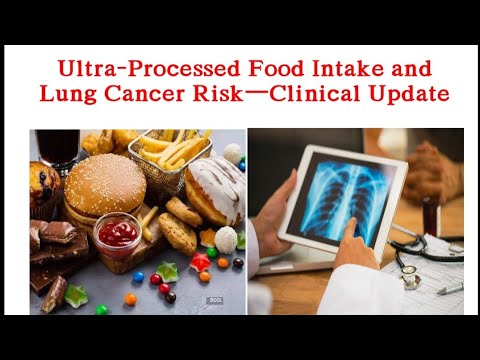It’s not just cigarettes anymore. The enemy might be sitting quietly on your kitchen shelf — brightly packaged, perfectly preserved, and deadly.
A chilling 12-year Chinese study has found that diets heavy in ultra-processed foods (UPFs) — the chips, sugary drinks, frozen pizzas, instant noodles, processed meats, and candy bars many people eat daily — are strongly linked to lung cancer, even among non-smokers. The findings are grim: those who consumed the most UPFs faced a 41% higher overall risk of lung cancer compared to those who consumed the least.
The numbers get darker. The research showed a 37% higher risk for non-small cell lung cancer (NSCLC) — the most common form, accounting for 85% of cases — and a 44% higher risk for small cell lung cancer (SCLC), a rarer, more aggressive cancer notorious for its speed and early spread.
And these aren’t distant statistics. Lung cancer remains the second most common cancer in U.S. men and women, with an estimated 230,000 cases and 125,000 deaths projected for 2025. While smoking rates are falling, lung cancer diagnoses among women and younger non-smokers are quietly rising — and diet could be one of the hidden drivers.
A Toxic Menu
The study dissected the daily eating habits of thousands, revealing that high-risk participants averaged six servings of UPFs daily — compared to just half a serving in the lowest-risk group. The most common offenders? Processed lunch meats, caffeinated sodas, breakfast cereals loaded with additives, and cheap, greasy fast-food staples.
Scientists pointed to several chemical culprits lurking in these products:
-
Carrageenan – a thickener in ice cream, plant-based milks, deli meats, and even some infant formulas, linked to gut inflammation and possibly lung cancer.
-
Acrolein – a DNA-damaging toxin created during high-heat cooking like frying or roasting, and also found in cigarette smoke.
-
PCBs – industrial chemicals banned decades ago but still leaching from food packaging and equipment, classified as “probably carcinogenic” by the EPA.
These compounds can disrupt the gut microbiome, trigger chronic inflammation, generate oxidative stress, and directly damage DNA — all pathways to cancer.
The Bigger Picture
Ultra-processed foods have already been linked to colorectal and other cancers. Now, this research strengthens the case that UPFs are not just “unhealthy,” but may act like a slow, daily dose of poison. And yet, Big Food keeps pumping them into the market — engineered for addiction, cheap to produce, and profitable to the last bite.
Dr. Matthew Schabath of the Moffitt Cancer Center, commenting on the study, said that while UPFs aren’t officially labeled carcinogens, the mounting evidence from both lab and epidemiological studies should be a wake-up call.
The Warning You Can’t Ignore
This isn’t about swearing off every snack forever. It’s about realizing that the convenience of a ready-made meal, the sweetness of that soda, or the salty crunch of that packaged snack may be silently eroding your health. Replacing UPFs with fresh, minimally processed foods — fruits, vegetables, fish, whole grains — isn’t just “better for you.” It might be the difference between life and death.
The takeaway is stark: the dangers of ultra-processed foods are no longer speculative. They’re written in the data, in the hospital charts, and in the rising cancer diagnoses of people who never touched a cigarette.










